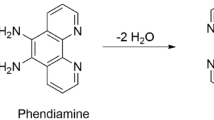Abstract
FOLLOWING the work of Smith and Page1, amines have been widely used for the extraction of acids from aqueous solutions. We have applied this process to the hydrolysis of inorganic salts in aqueous solution without the introduction of any reagents into the aqueous phase. An amine which is immiscible with the aqueous phase is used to extract the acid formed on the hydrolysis of the salt and under suitable conditions insoluble complexes can be precipitated. Thus complexes of UO2++, Th4+, Fe3+ and RuNO3+ have been precipitated by us, and although the anion has usually been nitrate we have also carried out precipitations from sulphate media. Other anions could also be used since amines extract many acids efficiently (see, for example, Moore2).
This is a preview of subscription content, access via your institution
Access options
Subscribe to this journal
Receive 51 print issues and online access
$199.00 per year
only $3.90 per issue
Buy this article
- Purchase on Springer Link
- Instant access to full article PDF
Prices may be subject to local taxes which are calculated during checkout
Similar content being viewed by others
References
Smith, E. L., and Page, J. E., J. Soc. Chem. Indust., 67, 48 (1949).
Moore, F., Anal. Chem., 29, 1660 (1957).
Sutton, J., J. Chem. Soc., Supp. Issue No. 2, 275 (1949).
Author information
Authors and Affiliations
Rights and permissions
About this article
Cite this article
JENKINS, I., ROBSON, J. Use of Amines in Inorganic Hydrolysis. Nature 194, 864–865 (1962). https://doi.org/10.1038/194864b0
Issue Date:
DOI: https://doi.org/10.1038/194864b0
Comments
By submitting a comment you agree to abide by our Terms and Community Guidelines. If you find something abusive or that does not comply with our terms or guidelines please flag it as inappropriate.



